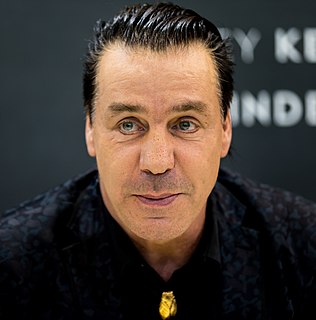A Quote by Noam Chomsky
You could imagine a language exactly like English except it doesn't have connectives like 'and' that allow you to make longer expressions. An infant learning truncated English would have no idea about this: They would just pick it up as they would standard English.
Related Quotes
James Joyce's English was based on the rhythm of the Irish language. He wrote things that shocked English language speakers but he was thinking in Gaelic. I've sung songs that if they were in English, would have been banned too. The psyche of the Irish language is completely different to the English-speaking world.
He would not mind hearing Petrus's story one day. But preferably not reduced to English. More and more he is convinced that English is an unfit medium for the truth of South Africa. Stretches of English code whole sentences long have thickened, lost their articulations, their articulateness, their articulatedness. Like a dinosaur expiring and settling in the mud, the language has stiffened. Pressed into the mold of English, Petrus's story would come out arthritic, bygone"(117).
One of my favorite tricks was taking a page and having the first student translate it from English into whatever language he or she was working on, and the next one would translate it back into English and then into the foreign language, and we'd go around the room and compare the two English versions at the end, and it would be amazing how much survived.
I think in Arabic at times, but when I'm writing it's all in English. And I don't try to make my English sound more Arabic, because it would be phony - I'm imagining Melanie Griffith trying to do a German accent in Shining Through. It just wouldn't work. But the language in my head is a specific kind of English. It's not exactly American, not exactly British. Because everything is filtered through me, through my experience. I'm Lebanese, but not that much. American, but not that much. Gay, but not that much. The only thing I'm sure of, really, is that I'm under 5'7".
English is the largest of human tongues, with several times the vocabulary of the second largest language -- this alone made it inevitable that English would eventually become, as it did, the lingua franca of this planet, for it is thereby the richest and most flexible -- despite its barbaric accretions . . . or, I should say, because of its barbaric accretions. English swallows up anything that comes its way, makes English out of it.
At every point I wished that I was born English. They need to make it colder in here. You could hang meat in this room. But, yeah...I grew up in a very English household. My folks were from Liverpool. I've said this before, but there is nothing more English than an Englishman that no longer lives in England.
Though representatives of many ethnic groups came together in the United States, English became their common language. Apparently, this was a natural choice. One can imagine what would have happened if members of each nation moving to the U.S. had spoken only their own tongues and refused to learn English.
The revival of Hebrew, as a spoken language, is a fascinating story, which I'm afraid I cannot squeeze into a few sentences. But, let me give you a clue. Think about Elizabethan English, where the entire English language behaved pretty much like molten lava, like a volcano in mid-eruption. Modern Hebrew has some things in common with Elizabethan English. It is being reshaped and it's expanding very rapidly in various directions. This is not to say that every one of us Israeli writers is a William Shakespeare, but there is a certain similarity to Elizabethan English.
So you want another story?" Uhh... no. We would like to know what really happened." Doesn't the telling of something always become a story?" Uhh... perhaps in English. In Japanese a story would have an element of invention in it. We don't want any invention. We want the 'straight facts,' as you say in English." Isn't telling about something--using words, English or Japanese--already something of an invention? Isn't just looking upon this world already something of an invention?





































